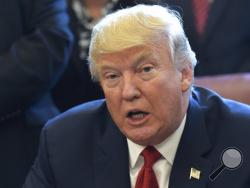WASHINGTON (AP) — There's an unconventional new president in the White House. And the Republicans now have a new lock on both ends of Washington's Pennsylvania Avenue. But the capital city is still up to its old gridlock tricks.
Just as occurred repeatedly during the Obama administration, the government is only days away from a shutdown, and Congress and the White House are engaged in familiar partisan brinkmanship.
How little has really changed under President Donald Trump.
Some of the issues are different this time around as lawmakers scramble to finish up the annual government-wide spending bills that are Congress' most basic function. The $1 trillion catch-all legislation for the remainder of the 2017 budget year is leftover business from last year and comes due Friday at midnight.
Without action before then, the government will partially shut down Saturday, which happens to be the 100th day of Trump's presidency.
Will that happen? Lawmakers do not expect a shutdown.
Instead, a very short-term extension at existing funding levels is likely. Such "continuing resolutions" are familiar on Capitol Hill when Congress needs a little more time to complete its business, yet signing one to keep the government running while Trump marks his 100th day in office is an ignominious position for him.
The difficulties point to a weakness of Trump's administration, some Republicans privately say: Despite his self-proclaimed deal-making prowess, he had little exposure to the rituals and rhythms of Congress before to taking office, and his team is light on experienced legislative hands. The former lawmakers he has brought on board, such as Budget Director Mick Mulvaney, were not known for cutting deals during their time on Capitol Hill.
"I'm sure the president has a much better sense of the legislative process than he did a year ago or even 100 days ago, and every president does, no matter how well prepared they think they are for that job," said Sen. Roy Blunt, R-Mo.
"Congress generally works on the calendar not the clock, and when you say that April 28 is going to be the day, I think you have to assume not much gets done before April 28," Blunt added.
The remainder of the year will only bring more crucial deadlines. Once this year's federal spending is finally set, bills for the 2018 budget year must be passed. And the government's borrowing limit needs to be raised or the U.S. risks an unprecedented default this fall.
Under the Obama administration, divisions among Republicans were already causing problems. Over the objections of GOP leaders, a faction of conservatives tried to use must-pass spending bills to promote one pet cause or another, with little to show in the end. An unsuccessful push to "defund Obamacare" led to a 16-day partial shutdown in 2013, temporarily tanking the GOP's poll numbers.
Having an outsider Republican president in the White House has not eliminated those divisions, as has already become clear from the House's failure to advance a health care bill.
On the spending legislation the intraparty divisions emerged in a different form, as Trump himself, or at least some of his White House lieutenants, threw a last-minute wrench into negotiations by suddenly demanding money for construction of a border wall on the U.S.-Mexico border.
Up until then negotiations had been proceeding fairly smoothly, according to participants. With Democratic votes needed to pass the legislation, senior Republicans had no expectation of achieving the president's most contentious policy objectives in the spending bill, and instead planned to include border security money that would not be designated specifically for a wall.
Trump's sudden push for the wall money sent talks into a tailspin and Democrats into high dudgeon. And even after he backed off, apparently clearing the way for final work toward a deal, the episode left some fellow Republicans questioning whether their party, now in full control of Washington, will be able to perform any better under Trump than under Obama.
"This remains our challenge here in the House. We've had a very difficult time performing the very basic fundamental tasks of governing," said Rep. Charlie Dent, R-Pa. "I certainly hope those dynamics change."
Republicans accuse the Democrats of courting a shutdown for political gain.
"Our colleagues on the other side of the aisle feel that any kind of shutdown works in their favor, because Republicans always get blamed for it," said Sen. John Hoeven of North Dakota. "So they're negotiating really hard, I mean we're really going the extra mile."
Democrats, on the other hand, say Republicans have only themselves to blame.
"I think the main reason they're really struggling to pass the FY17 appropriations is not because of vigorous opposition from Democrats, it's because of internal disagreements," said Democrat Chris Coons of Delaware. "The reality is a Republican president and a Republican-controlled Congress ought to be able to get the government funded and moving forward."
That's something else that never changes: No matter who's in charge and what they're fighting over, the other party is to blame.
___
Associated Press writer Mary Clare Jalonick contributed.

